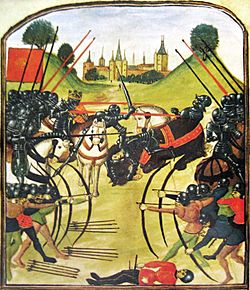Richard Hastings, Baron Welles facts for kids
Quick facts for kids Sir Richard Hastings |
|
|---|---|
| Spouse(s) | Joan Welles, 9th Baroness Willoughby de Eresby Joan Romondbye |
| Issue | |
| Anthony Hastings | |
| Father | Sir Leonard Hastings |
| Mother | Alice Camoys |
| Died | 1503 |
| Burial | Greyfriars, London |
Sir Richard Hastings, Baron Welles (who died in 1503), was an important English knight during the 1400s. He was the son of Sir Leonard Hastings and the younger brother of William Hastings, 1st Baron Hastings. Richard was a favorite of King Edward IV. The King gave him control of lands from the baronies of Willoughby and Welles after Richard married Joan Welles, who was the rightful owner of those lands. Sir Richard also fought in a big battle called Tewkesbury. He passed away in 1503 and was buried in Greyfriars, London.
Contents
Sir Richard's Family
Richard Hastings was the second son of Sir Leonard Hastings (who lived from 1396 to 1455) and Alice Camoys. Alice was the daughter of Thomas de Camoys, 1st Baron Camoys. Richard had three brothers and three sisters:
- William Hastings, 1st Baron Hastings: He was Richard's older brother. William married Katherine Neville, Baroness Hastings, who was the sister of the powerful Richard Neville, Earl of Warwick. Sadly, William was executed in 1483 by order of the future King Richard III.
- Sir Ralph Hastings (died 1495): He lived in Harrowden, Northamptonshire. Ralph married Amy Tattershall and they had six daughters.
- Thomas Hastings.
- Elizabeth Hastings (born around 1450, died 1508): She married Sir John Donne before 1465. They had two sons and two daughters.
- Anne Hastings: She married Thomas Ferrers.
- Joan Hastings: She married John Brokesby.
Sir Richard's Career and Role in History

During the time of the Wars of the Roses, which were battles between two powerful families (the Houses of York and Lancaster) for the English throne, Sir Richard Hastings strongly supported the House of York.
Marriage and Land Ownership
Around 1470, Richard married Joan Welles. Joan was set to inherit important lands and titles from her family. Her father, Richard Welles, 7th Baron Welles, and her brother, Sir Robert, had been executed by King Edward IV. This happened because of an uprising against the King.
After their deaths, King Edward IV took control of Sir Robert Welles's lands. However, on June 1, 1470, the King gave these lands to Joan and her new husband, Sir Richard Hastings. This meant they could take over all the lands that Joan should have inherited from her father and brother. Joan also became the Baroness of Willoughby and Welles.
Fighting for the King
A year later, on May 4, 1471, Hastings fought alongside the winning Yorkist side at the Battle of Tewkesbury. After this victory, King Edward IV made him a knight. In 1475, while his older brother, William, was with the King in France, Richard was given important jobs. He became the deputy surveyor for the Constable of Nottingham Castle and also a magistrate for several forests and parks in different counties.
Changes in Titles and Lands
Joan Welles passed away around 1474 or 1475. After her death, her family's titles were taken away by Parliament. This was done so King Edward IV could give Sir Richard Hastings the right to use most of the Welles and Willoughby lands for the rest of his life. Because of this, Sir Richard was called to Parliament as "Lord Hastings of Welles" or "Lord Welles" from 1482 to 1483.
When King Edward IV died in 1483, his brother, Richard III, became king. Sadly, Richard III had Sir Richard's older brother, William Hastings, executed. Despite this, Sir Richard Hastings attended Richard III's coronation. The new King also gave Sir Richard a yearly payment and made him Master of Game for the deer in the Tattershall area.
Under a New King
Richard III died at the Battle of Bosworth in 1485, and Henry VII became the new king. Under Henry VII, the old decisions that took away Joan Welles's family titles were reversed. This meant that Joan's uncle, John Welles, 1st Viscount Welles, became Lord Welles again.
Because of these changes, Sir Richard Hastings was no longer officially recognized as Lord Welles. However, King Henry VII made sure that Sir Richard could keep all the lands that had belonged to Joan Welles's father for the rest of his life. Even after this, Sir Richard continued to call himself "Lord Willoughby" until he died. His brother, Sir Ralph Hastings, and Sir Richard himself in his will, referred to him as "Lord Willoughby."
Sir Richard Hastings was buried in September 1503 at the Greyfriars, London in London.
Marriages and Children
Sir Richard Hastings married twice.
First Marriage
His first wife was Joan Welles. Joan was the daughter of Richard Welles, 7th Baron Welles. She was also the rightful Baroness Willoughby through her mother, Joan Willoughby, 7th Baroness Willoughby de Eresby. Richard and Joan had one son named Anthony Hastings, but Anthony passed away before his father.
Second Marriage
His second wife was Joan Romondbye. She was the widow of Richard Pigot. Sir Richard and Joan Romondbye did not have any children together.
 | Roy Wilkins |
 | John Lewis |
 | Linda Carol Brown |

